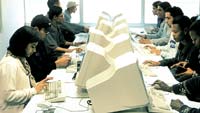Information made easy
17 March 2003
Essays, course work and dissertations and theses need a careful approach to noting sources of information, evaluating the quality of information and quoting and citing it correctly. This is where UCT's Centre for Information Literacy (CIL) plays a vital role, specialising in techniques of finding, using and recording information.
The CIL is a complementary service to those of the Writing Centre and UCT Libraries.
CIL staff, who also teach the Library and Information Studies programme of the humanities faculty, are highly skilled in teaching students how to find and use information. They focus on the skills of information management; provide professional advice on citation technique and styles and demonstrate how to use the Personal bibliographic management software, which is becoming an essential tool for academic writing.
CIL runs workshops for academic departments on web searching specific to subject areas, citation technique and information management. The Centre also offers individual advice and tutorials.
The CIL offers a “drop-in†service, run by information literacy tutors, postgraduate students specialising in library and information science. They can assist with problems of searching for information and, because they are knowledgeable of a wide range of library and other information services, can provide excellent guidance on sources to use.
If you think that the Internet will solve everything, think again, said CIL director Professor Peter Underwood.
“Recent studies reveal that a substantial proportion of web sites — a reliable estimate is at least 58% — are invisible to general web search engines. The information world is a complicated place where professional guidance is often the quickest way to learn ways of finding relevant information. Using a search engine is only one technique and often not the quickest path to finding the information that matters.â€
The CIL has also developed techniques for detecting electronic plagiarism, “a regrettable necessity†as a service to the academic community. “By encouraging the development of good habits in citing and using information sources, CIL staff hope that this is one service that will be little used,†Underwood added.
The UCT Library web site includes an information literacy resource developed for the Cape Higher Education Consortium (CHEC). It provides comprehensive website guidance on locating and using information.
You can find the CIL on Level 4 of the Student Development and Services Building on Upper Campus.
 This work is licensed under a Creative Commons Attribution-NoDerivatives 4.0 International License.
This work is licensed under a Creative Commons Attribution-NoDerivatives 4.0 International License.
Please view the republishing articles page for more information.
Related
‘Let the science begin’
04 Mar 2026










